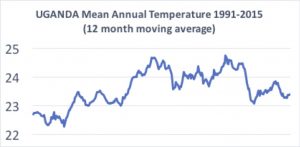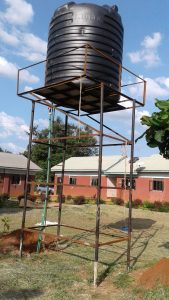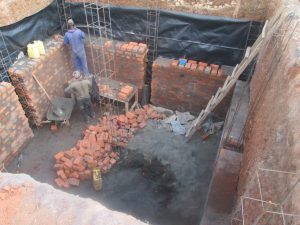The Humanist Schools in Uganda have faced acute water shortage. Increases in student numbers have put pressure on the limited water resources and the situation has been exacerbated by changes in climatic conditions. Since 1991 the  mean annual temperature in Uganda has risen by 1.5°C (see graph). The additional energy in the atmosphere has caused greater variability in weather systems, which has increased the ferocity of rainstorms and given rise to previously unknown periods of drought. Rainfall unpredictability makes it difficult for farmers to time the planting of crops and the onset of unexpected droughts causes almost mature crops to wither on the stem. This has provoked food shortages and further north and east in Uganda there have been periodic famines. Just over a year ago crops failed around the Mustard Seed School, and some people died of starvation.
mean annual temperature in Uganda has risen by 1.5°C (see graph). The additional energy in the atmosphere has caused greater variability in weather systems, which has increased the ferocity of rainstorms and given rise to previously unknown periods of drought. Rainfall unpredictability makes it difficult for farmers to time the planting of crops and the onset of unexpected droughts causes almost mature crops to wither on the stem. This has provoked food shortages and further north and east in Uganda there have been periodic famines. Just over a year ago crops failed around the Mustard Seed School, and some people died of starvation.
Climate change has directly affected the schools:
1. Poor harvests have meant that parents of children in the schools have had less surplus food to sell to raise money for school fees, so school fee income has fallen.
2. The shortage of food has forced up market prices. This has raised the costs of students’ meals and put pressure on school budgets. In recent years food costs have risen at twice the rate of prices in general.
3. More people have been drawing water from wells, which has led to a progressive lowering of the water table. At Mustard Seed School the main borehole, that UHST paid to have drilled in the school compound, has been pumped dry.
All of this has come at a time when student numbers in the Humanist Schools has been growing, as parents have been attracted by the higher standards of education and welfare being offered in the schools we support.
 For the past few years the schools have had no alternative but to turn to UHST for help. We have provided emergency funds to buy food immediately after harvests, when it is available and cheaper. When harvests have failed and local fee income has dropped, we have needed to provide supplementary funds to meet day-to-day running costs. When local parents have been unable to pay the fees for children entering for national examinations, we have stepped in to cover the shortfall. When the first borehole ran dry at Mustard Seed School UHST paid for a new borehole to be sunk near a swamp over half a mile from the school. Since then, students have operated a water rota, taking time out of lessons to fetch water needed for washing, drinking, food preparation and cleaning.
For the past few years the schools have had no alternative but to turn to UHST for help. We have provided emergency funds to buy food immediately after harvests, when it is available and cheaper. When harvests have failed and local fee income has dropped, we have needed to provide supplementary funds to meet day-to-day running costs. When local parents have been unable to pay the fees for children entering for national examinations, we have stepped in to cover the shortfall. When the first borehole ran dry at Mustard Seed School UHST paid for a new borehole to be sunk near a swamp over half a mile from the school. Since then, students have operated a water rota, taking time out of lessons to fetch water needed for washing, drinking, food preparation and cleaning.
Despite these measures, water supply problems have continued to disrupt education in the Humanist schools. When we visited the schools earlier this year, it was clear that steps had to be taken to alleviate the situation. After visiting the regional water company, near Mustard Seed School, we have been able to arrange for the school to be connected to piped water coming from a pumping station on the Rive Nile. This has involved running a pipe to the school 1.5km from the main supply pipe to Kamuli Town. The water will be pumped under pressure to two high-level water tanks – one on each school site. The project, which cost almost £6,000, is now complete. Moses Kamya, the Mustard Seed School Director, has written that:
The Water Company has finished laying pipes and putting the tanks on towers. Taps are in place around the school and we are only waiting for the pumping station to be brought into operation. The children are eager to use tap water in showers and for washing clothes without the hassle of travelling to the borehole. The cooks are eager too since they fetch water continually for kitchen use. It will now be on their doorstep. We are very grateful to UHST for this timely innovation, which will transform day-to-day conditions in the school.
 At Isaac Newton High School the has been an urgent need to capture and store more water on the school site, in order to supplement the water being pumped from the valley below. UHST has given the school £4,000 to construct an underground storage tank, which will take rain water from the roofs of the new girls’ hostel and the about-to-be-built 4-classroom block. This large reserve will offer some security during periods of drought. Unfortunately, due to its remote rural location, there is no prospect of mains water being brought to the school, so it has to cater for its own needs and those of the immediate village. Peter Kisirinya, the Director of Isaac Newton School, made the following comments:
At Isaac Newton High School the has been an urgent need to capture and store more water on the school site, in order to supplement the water being pumped from the valley below. UHST has given the school £4,000 to construct an underground storage tank, which will take rain water from the roofs of the new girls’ hostel and the about-to-be-built 4-classroom block. This large reserve will offer some security during periods of drought. Unfortunately, due to its remote rural location, there is no prospect of mains water being brought to the school, so it has to cater for its own needs and those of the immediate village. Peter Kisirinya, the Director of Isaac Newton School, made the following comments:
The water project is on-going with the walls ready and waiting for the top slab to be fitted in one week, after a months provision for setting of the columns and walls. We will have 98,000 litres of harvested water from the three buildings and this will be rain water with minimum contamination to be used for the girls community to wash using less soap – the underground water we use at present has some hardness so it takes some more soap. The girls will have the water in their courtyard and this will help them a great deal. We have had problems with storm runoff but this will reduce since all the water from the roof will be captured. In case of breakdown of the main water supply we shall have water available for preparing the meals.
We are very grateful to UHST supporters who have made possible these essential improvements to water provision in the schools, which will have a big effect on student welfare. Unfortunately, neither scheme will alleviate the fundamental impact of long-term climate change on the schools’ host communities.
Climate Change Hits Uganda Schools
Posted: November 26, 2017 by Steve Hurd
The Humanist Schools in Uganda have faced acute water shortage. Increases in student numbers have put pressure on the limited water resources and the situation has been exacerbated by changes in climatic conditions. Since 1991 the mean annual temperature in Uganda has risen by 1.5°C (see graph). The additional energy in the atmosphere has caused greater variability in weather systems, which has increased the ferocity of rainstorms and given rise to previously unknown periods of drought. Rainfall unpredictability makes it difficult for farmers to time the planting of crops and the onset of unexpected droughts causes almost mature crops to wither on the stem. This has provoked food shortages and further north and east in Uganda there have been periodic famines. Just over a year ago crops failed around the Mustard Seed School, and some people died of starvation.
mean annual temperature in Uganda has risen by 1.5°C (see graph). The additional energy in the atmosphere has caused greater variability in weather systems, which has increased the ferocity of rainstorms and given rise to previously unknown periods of drought. Rainfall unpredictability makes it difficult for farmers to time the planting of crops and the onset of unexpected droughts causes almost mature crops to wither on the stem. This has provoked food shortages and further north and east in Uganda there have been periodic famines. Just over a year ago crops failed around the Mustard Seed School, and some people died of starvation.
Climate change has directly affected the schools:
1. Poor harvests have meant that parents of children in the schools have had less surplus food to sell to raise money for school fees, so school fee income has fallen.
2. The shortage of food has forced up market prices. This has raised the costs of students’ meals and put pressure on school budgets. In recent years food costs have risen at twice the rate of prices in general.
3. More people have been drawing water from wells, which has led to a progressive lowering of the water table. At Mustard Seed School the main borehole, that UHST paid to have drilled in the school compound, has been pumped dry.
All of this has come at a time when student numbers in the Humanist Schools has been growing, as parents have been attracted by the higher standards of education and welfare being offered in the schools we support.
Despite these measures, water supply problems have continued to disrupt education in the Humanist schools. When we visited the schools earlier this year, it was clear that steps had to be taken to alleviate the situation. After visiting the regional water company, near Mustard Seed School, we have been able to arrange for the school to be connected to piped water coming from a pumping station on the Rive Nile. This has involved running a pipe to the school 1.5km from the main supply pipe to Kamuli Town. The water will be pumped under pressure to two high-level water tanks – one on each school site. The project, which cost almost £6,000, is now complete. Moses Kamya, the Mustard Seed School Director, has written that:
The Water Company has finished laying pipes and putting the tanks on towers. Taps are in place around the school and we are only waiting for the pumping station to be brought into operation. The children are eager to use tap water in showers and for washing clothes without the hassle of travelling to the borehole. The cooks are eager too since they fetch water continually for kitchen use. It will now be on their doorstep. We are very grateful to UHST for this timely innovation, which will transform day-to-day conditions in the school.
The water project is on-going with the walls ready and waiting for the top slab to be fitted in one week, after a months provision for setting of the columns and walls. We will have 98,000 litres of harvested water from the three buildings and this will be rain water with minimum contamination to be used for the girls community to wash using less soap – the underground water we use at present has some hardness so it takes some more soap. The girls will have the water in their courtyard and this will help them a great deal. We have had problems with storm runoff but this will reduce since all the water from the roof will be captured. In case of breakdown of the main water supply we shall have water available for preparing the meals.
We are very grateful to UHST supporters who have made possible these essential improvements to water provision in the schools, which will have a big effect on student welfare. Unfortunately, neither scheme will alleviate the fundamental impact of long-term climate change on the schools’ host communities.
Category: News